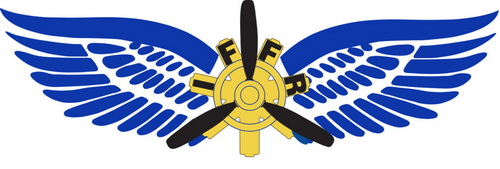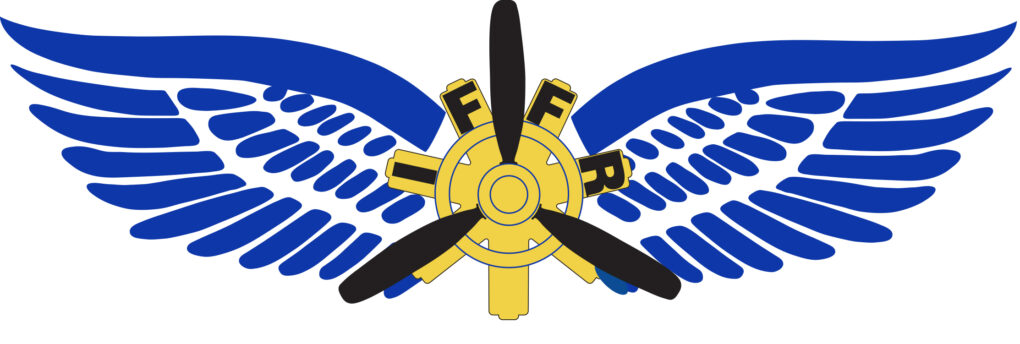Resources
December 2, 2021
The International Fellowship of Flying Rotarians
BYLAWS
ARTICLE I: PURPOSE AND PRINCIPAL OFFICE
Section 1. Purpose:
The International Fellowship of Flying Rotarians (IFFR) is dedicated to promoting aviation as an opportunity for fellowship and service. It operates in accordance with Rotary International policy, but is not an agency of, or controlled by, Rotary International.
Section 2: Principal Office:
The principal office of IFFR shall be determined by the Board of Directors.
ARTICLE II: MEMBERSHIP
Section 1. General Membership:
Membership is open to any individual who has an active interest in aviation consistent with the purposes of IFFR. Membership is subject to acceptance by the section and the payment of dues. Non-Rotarian members are encouraged to become members of Rotary.
Section 2. Honorary Member:
This classification shall be a special type of non-dues paying membership conferred by the unanimous vote of the Executive Committee for service to IFFR. This special membership lasts through the term of the then current President.
Section 3. Life Membership:
Entry to this classification is no longer available. Existing Life Members shall be entitled to all rights and privileges accorded to IFFR members. International dues are not payable, but Section or other dues must be paid to keep the membership current.
Section 4. Special Life Member:
A Special Life Member shall be an IFFR member selected by the unanimous vote of the Executive Committee which shall consider the length of membership and service to IFFR. Special Life Members shall pay no International or Section dues.
ARTICLE III: OFFICERS, EXECUTIVE COMMITTEE AND BOARD OF DIRECTORS
Section 1. Officers. The officers and their duties shall be:
a. President: The President shall preside at all meetings of IFFR; serve as Chair of the Executive Committee and ex-officio member of all committees; appoint such other functionaries as will expedite the work of IFFR; and perform all other duties incidental to this office. The President’s position shall be filled each second year by the previous term’s President Elect. The President must be an active Rotarian.
b. President Elect: The President Elect shall assist the President in his duties as the President may direct and shall perform all other duties incidental to this office. The President Elect shall be elected at the Annual General Meeting (AGM) a minimum of one year prior to the end of the President’s term of office. The President Elect must be an active Rotarian.
c. Vice Presidents: A Vice President for each Region shall be appointed by the President. A Vice President should be an active Rotarian
d. Secretary: The Secretary shall record the minutes of all meetings of IFFR; handle all correspondence relative to IFFR’s activities; and perform all other duties incidental to this office. The Secretary shall ensure all documents posted on the IFFR Website are the current and latest version. The Secretary shall be appointed by the Executive Committee each second year prior to the AGM.
e. Treasurer: The Treasurer shall have custody of all IFFR funds and receive and disburse all IFFR’s monies; maintain and complete an accurate record of all transactions; and prepare annual financial reports to be published on the IFFR website prior to the AGM. The Executive Committee shall appoint the Treasurer each second year prior to the AGM.
f. Database manager: The Database manager shall maintain the membership database and have a current directory of members available on the website. The Database Manager shall be appointed by the Executive Committee every second year prior to the AGM.
g. Webmaster: The Webmaster shall develop and maintain the IFFR International Website as a means of communication with current and potential members. The Webmaster shall also liaise with the other Officers to ensure the Website covers the global activities of IFFR. The Executive Committee shall appoint the Webmaster each second year prior to the AGM.
Section 2. Executive Committee.
a. The Executive Committee shall consist of the President, Immediate Past President, President Elect, Vice Presidents and Secretary (provided that person is a member of IFFR).
b. The Executive Committee shall consider and evaluate all recommendations made to it by the President and shall take all necessary action; approve or disapprove all committee appointments; and advise and assist the President in all matters pertaining to the arrangements for General Meetings.
Section 3. Board of Directors.
The Board of Directors shall consist of the President, President Elect, last five Past Presidents, Vice Presidents, Section Chairs, Secretary, Treasurer, Database manager and Webmaster. Past Presidents who are Rotarians, and whose terms of office ended prior to July 1st 2018, shall remain members of the Board of Directors until they terminate their membership. Any past president may leave the Board by giving written notice to the World President. A board member should be an active Rotarian.
Section 4. Term of office.
The term of office for all positions will be from July 1st to June 30th two years later.
Section 5. Voting.
In all voting the President has a regular vote, and in the event of a tie, the President may also cast an additional deciding vote.
ARTICLE IV: VACANCIES
If the President position becomes vacant the President-Elect shall serve as President; if a Vice President position becomes vacant the President shall appoint a replacement. If a Secretary, Treasurer, Database manager or Webmaster position becomes vacant, the President, with Executive Committee approval, shall appoint a replacement. Replacements will serve the balance of the term.
ARTICLE V: REGIONS AND SECTIONS
Section 1. Composition. IFFR shall be organized into Regions and Sections:
a. Americas Region: (North America, Central America, South America, Caribbean, Russia east of the Urals)
1. Northeast Section: Connecticut, Delaware, Massachusetts, Maryland, Maine, New Hampshire, New Jersey, New York, Ontario, Pennsylvania, Quebec, Rhode Island, Vermont, New Brunswick, Nova Scotia.
2. Southeast Section: Alabama, Caribbean, Florida, Georgia, Kentucky, Mississippi, North Carolina, South Carolina, Tennessee, Virginia, West Virginia.
3. North Central Section: Iowa, Illinois, Indiana, Manitoba, Michigan, Minnesota, North Dakota, Nebraska, Ohio, Saskatchewan, South Dakota, Wisconsin.
4. South Central Section: Arkansas, Kansas, Louisiana, Mexico, Missouri, Oklahoma, Texas, Cuba, Central America, South America.
5. Northwest Section: Alberta, British Columbia, Idaho, Montana, Oregon, Utah, Washington, Wyoming.
6. Southwest Section: Arizona, California, Colorado, Hawaii, New Mexico, Nevada.
7. Alaskan Section: Alaska, Yukon.
b. European Region: (Europe, Africa, Middle East, Russia west of the Urals)
1. United Kingdom Section: England, Wales, Scotland, Northern Ireland, Channel Islands, Ireland.
2. French Section : France.
3. Benelux Section : Belgium, The Netherlands, Luxembourg.
4. Swiss Section: Switzerland.
5. Italian Section: Greece, Italy, Malta.
6. Scandinavian Section: Denmark, Finland, Iceland, Norway, Sweden, Estonia, Latvia, Lithuania.
7. German-Austrian Section: Austria, Germany.
8. Portuguese Section: Portugal, Spain.
c. Australasian Region: (Australasia, Asia)
1. Asia Section.
2. Australia Section.
3. New Zealand Section.
Section 2. Operations.
Each Section may have its own Chair, Officers and Committees elected by its members. It may levy dues for Section expenses on its members in addition to International dues. The Section’s Chair shall be elected by the Section to serve a term of two years or, lacking such an election, shall be appointed by the Regional Vice President. Sections are responsible for inducting and terminating members, and they should use careful judgment when doing so. Membership may be terminated for inappropriate behavior.
ARTICLE VI: MEETINGS
Section 1. Executive Committee:
An Executive Committee meeting may be called by the President or by a majority of the Executive Committee. It may be conducted in person or electronically.
Section 2. Board of Directors:
The Board of Directors shall meet at least once each year. Meetings may be conducted in person or electronically.
Section 3. Annual General Meeting (AGM):
There shall be at least one annual meeting for all members. One such meeting shall be held near the time of the Rotary International Convention.
ARTICLE VII: AMENDMENTS
Proposed amendments to the Bylaws shall be submitted to the Secretary. They shall be circulated to the Board of Directors at least thirty (30) days prior to a Board Meeting at which they will be considered. They may be amended at the Board meeting with the consent of the proposer, who may attend. Following the Board meeting, proposed amendments shall be circulated to the entire membership at least thirty (30) days prior to a General Meeting. Proposed amendments require a two-thirds majority of members voting in person or electronically to be adopted.
ARTICLE VIII: DUES
The annual dues of IFFR shall be determined at the AGM having placed before it the recommendations of the Board together with financial statements for the previous year, an update on the financial performance for the current year and a budget for the following year.
ARTICLE IX: COMMITTEES
The President shall appoint all committees, subject to Executive Committee approval, necessary to conduct the business of IFFR and carry out the aims and purposes of the organization. The duties of such committees shall be prescribed by the President and/or by the Executive Committee. Each committee shall publish its report prior to the AGM for presentation at that meeting.
ARTICLE X: FUNDS
Section 1. Deposits:
All monies of IFFR shall be deposited in the name of IFFR in an account at a recognized bank.
Section 2. Financial Statements:
The Treasurer shall prepare and publish yearly financial statements to the membership. The Treasurer shall file all Federal and/or State tax forms as required to maintain the tax-exempt status of IFFR.
Section 3. Audits:
The Board shall select an auditor, subject to approval by membership at the AGM or otherwise, who shall report to the Board and membership annually.
ARTICLE XI: NON PROFIT STATUS, EXEMPT ACTIVITIES AND DISSOLUTION
Section 1. Non-Profit Status; Exempt Activities Limitation.
IFFR is a non-profit benefit corporation, recognized as tax exempt under Section 501(c)(4) of the U.S. Internal Revenue Code (IRC). IFFR is not organized for profit, but operates exclusively to promote social welfare. Its net earnings shall be devoted exclusively to charitable, educational and recreational purposes. No IFFR member or representative shall undertake any action or activity on behalf of IFFR not permitted to be undertaken by an organization exempt under IRC Section 501(c)(4) as it now exists or may be amended. No part of IFFR’s net earnings shall inure to the benefit of any IFFR member or any private individual, except IFFR may pay reasonable compensation for services rendered and make payments to further the purposes set forth in these Bylaws.
Section 2. Distribution upon Dissolution.
After all debts have been satisfied, all remaining assets shall be distributed in a manner determined by the Executive Committee or by a court of competent jurisdiction, upon application by the Executive Committee. Such distributions shall be exclusively to charitable, religious, scientific, literary or educational organizations which would qualify under Section 501(c) of the 1986 IRC (or corresponding provisions of future U.S. Internal Revenue law) and regulations as they now exist or may be amended.
ARTICLE XII: RULES OF ORDER
Roberts Rules of Order govern all IFFR parliamentary practices to which they are applicable and not inconsistent with IFFR Bylaws.


 D5 Creation
D5 Creation